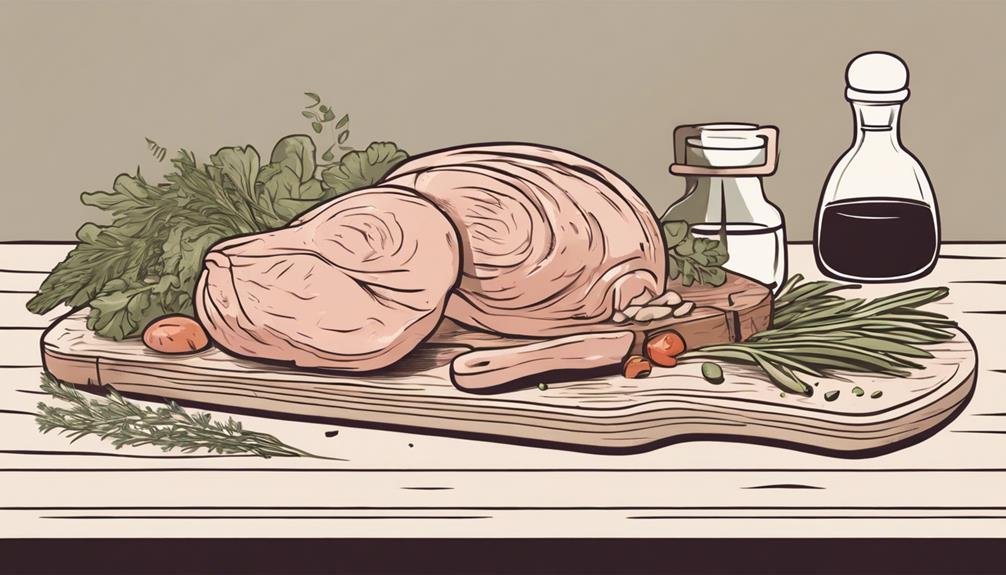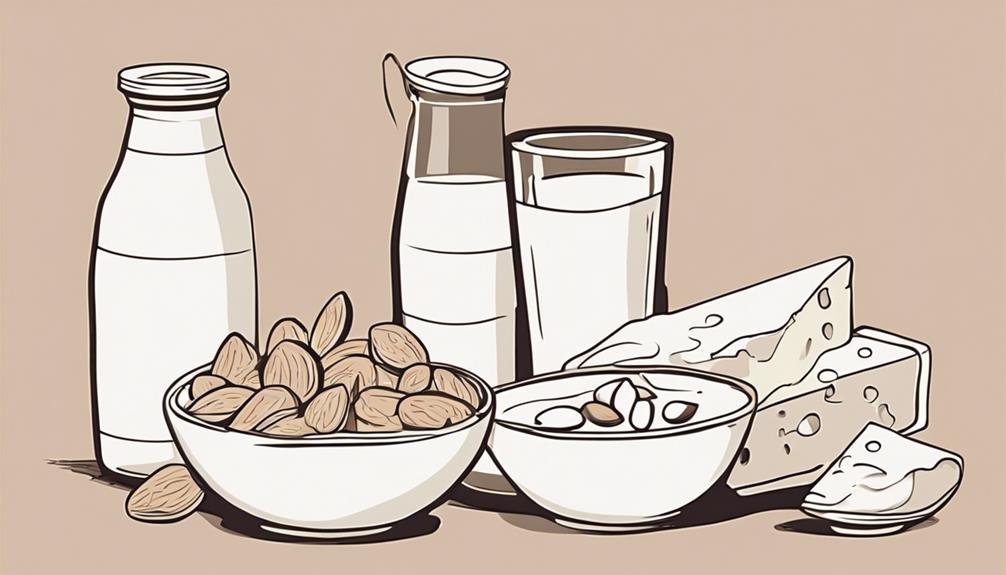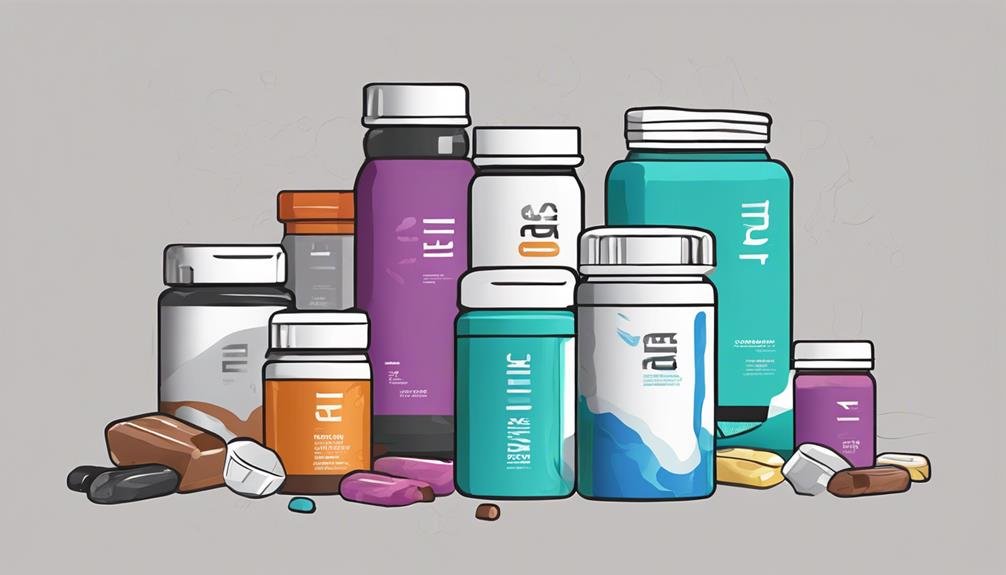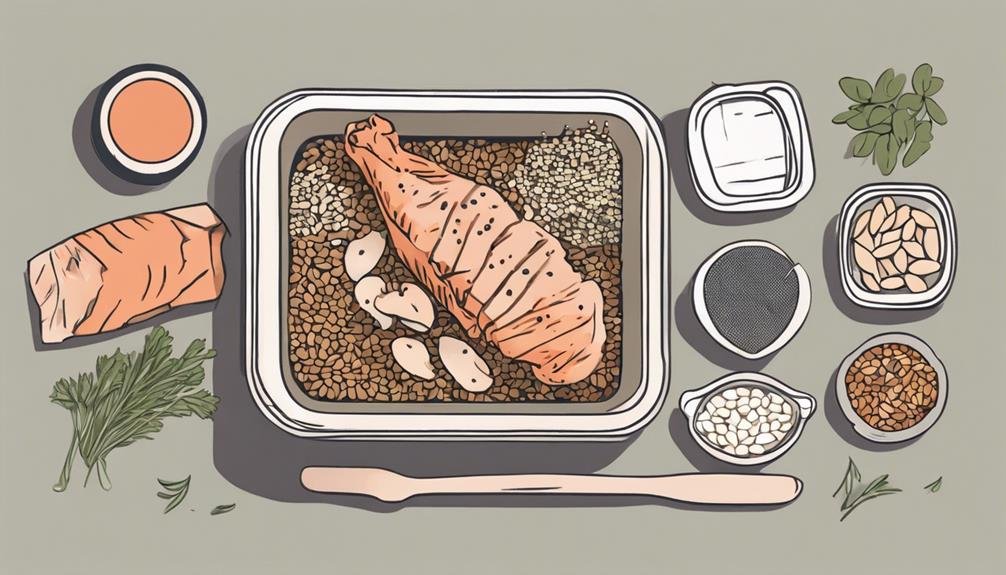Top Protein Sources for Men 40+: Nutrition Guide
As a man over 40, prioritizing protein is essential for maintaining muscle mass and overall health. You can incorporate lean meats like chicken, turkey, and pork tenderloin into your meals, which provide great protein with low fat. Fish, such as salmon or sardines, offers both protein and heart-healthy omega-3 fatty acids. Dairy products like Greek yogurt and cottage cheese are excellent choices too. Don't forget plant-based sources like legumes, nuts, and quinoa. Eggs are also a fantastic option for high-quality protein. Discovering various protein sources enhances your diet and can greatly support your health goals. Keep exploring for more insights!
Key Takeaways
- Prioritize lean meats like chicken, turkey, and pork tenderloin for high protein with low fat, supporting muscle maintenance and overall health.
- Incorporate fish such as salmon and sardines for protein and heart-healthy omega-3 fatty acids, aiming for at least two servings weekly.
- Utilize dairy products like Greek yogurt and cottage cheese for rich protein sources, essential amino acids, and bone health support.
- Include plant-based proteins from legumes, quinoa, nuts, and seeds to diversify nutrition and reduce reliance on animal products.
Importance of Protein After 40
As you hit 40, prioritizing protein becomes essential for maintaining muscle mass and overall health. Your body naturally begins to lose muscle as you age, which can lead to decreased strength and mobility.
Consuming adequate protein helps combat this decline, supporting muscle repair and growth. It's not just about building muscle, though; protein plays a critical role in hormone production, immune function, and even satiety, helping you manage weight effectively.
Aim for high-quality protein sources at every meal to keep your energy levels stable and your body functioning efficiently. Remember, incorporating protein into your diet can also improve recovery times after workouts, making it easier to stay active and fit as you navigate life in your 40s and beyond.
Lean Meat Options

Incorporating lean meat options into your diet provides an excellent way to boost your protein intake while minimizing unhealthy fats. Chicken breast and turkey are top choices, offering high protein with low fat content. Lean cuts of beef, like sirloin or tenderloin, also deliver essential nutrients without excess calories. Pork tenderloin stands out as another great option, providing similar benefits.
When preparing these meats, grilling, baking, or broiling helps retain their nutritional value while keeping added fats to a minimum.
Aim for variety by including different lean meats throughout the week. This not only keeps your meals interesting but also guarantees a broader range of nutrients, supporting your overall health as you age.
Stick to portion control for ideal results!
Fish and Seafood Choices
Fish and seafood are excellent protein sources that also provide essential omega-3 fatty acids, which can support heart health and reduce inflammation.
Incorporating a variety of fish into your diet, like salmon, mackerel, and sardines, guarantees you get a solid dose of these beneficial fats. Aim for at least two servings of fish per week to maximize health benefits.
Shellfish, such as shrimp, crab, and mussels, are also great options, offering high-quality protein with fewer calories.
When choosing seafood, opt for wild-caught varieties when possible to avoid harmful additives. Don't forget to take into account cooking methods; grilling, steaming, or baking keeps your meals healthy without unnecessary fats.
Immerse yourself in these delicious options to nourish your body effectively.
Dairy Products for Protein

Dairy products offer a rich source of protein that can complement your seafood choices and enhance your overall nutrition.
Incorporating items like Greek yogurt, cottage cheese, and low-fat milk into your diet can provide essential amino acids your body needs.
Greek yogurt, for instance, packs about 20 grams of protein per serving and makes for a great snack or breakfast base.
Cottage cheese is another excellent choice, delivering a high protein content with fewer calories.
If you prefer liquid options, low-fat milk not only offers protein but also calcium and vitamin D, vital for bone health, especially as you age.
Plant-Based Protein Sources
Plant-based protein sources are a fantastic way to fuel your body while adding variety to your meals. Incorporating these options can help you meet your protein needs without relying solely on animal products.
Here are three excellent plant-based protein sources to evaluate:
- Legumes: Beans, lentils, and chickpeas aren't only high in protein but also packed with fiber, which aids digestion and keeps you feeling full.
- Quinoa: This whole grain is a complete protein, meaning it contains all nine essential amino acids, making it a great addition to your diet.
- Nuts and Seeds: Almonds, chia seeds, and hemp seeds provide healthy fats along with protein, making them perfect for snacks or toppings.
Eggs and Their Benefits

Eggs are a powerhouse of nutrition, offering a rich source of protein along with essential vitamins and minerals that support overall health.
When you include eggs in your diet, you're not just getting high-quality protein; you're also benefiting from nutrients like vitamin B12, which aids in energy production, and choline, important for brain health.
The amino acids in eggs help with muscle repair and growth, making them an excellent choice post-workout.
Plus, they're versatile and easy to prepare—boil, scramble, or poach them to suit your taste.
Incorporating eggs into your meals can help you meet your daily protein needs while delivering other health benefits, ensuring you stay strong and energetic as you age.
Protein Supplements Overview

Protein supplements can be a convenient way to boost your intake, especially if you're struggling to meet your protein needs through whole foods alone. They come in various forms, making it easy to find an option that fits your lifestyle and preferences.
Here are three popular types of protein supplements to contemplate:
- Whey Protein: Derived from milk, it's quickly absorbed and perfect for post-workout recovery.
- Casein Protein: Also from milk but digests slowly, making it ideal for overnight muscle repair.
- Plant-Based Proteins: Options like pea, hemp, and brown rice cater to vegans and those with dairy sensitivities.
Incorporating these supplements can help you reach your protein goals effectively and support your overall health.
Meal Planning Tips

When planning your meals, focus on incorporating a variety of protein sources to guarantee you're meeting your nutritional needs effectively. Include lean meats like chicken and turkey, plant-based options such as beans, lentils, and quinoa, and dairy products like Greek yogurt or cottage cheese. Aim for at least one protein source in each meal and snack.
Prepping meals in advance can save you time and help you stick to your goals. Consider batch cooking proteins for the week and portioning them out for easy access.
Don't forget to pair your proteins with healthy fats and carbohydrates for balanced meals. Finally, keep experimenting with new recipes to keep your meals exciting and prevent boredom.
Questions
How Much Protein Should Men Over 40 Consume Daily?
You should aim for about 0.8 to 1 gram of protein per kilogram of body weight daily. Adjust based on your activity level and health goals to support muscle maintenance and overall wellness.
Can Protein Help Prevent Age-Related Muscle Loss?
Yes, protein can help prevent age-related muscle loss. By incorporating adequate protein into your diet, you support muscle maintenance and growth, keeping your body strong and functional as you age. Stay proactive about your health!
What Are the Best Cooking Methods for Preserving Protein Quality?
They say, "a stitch in time saves nine." To preserve protein quality, you should steam, grill, or bake your food. These methods maintain nutrients better than frying or boiling, ensuring you get the most out of your meals.
Are There Any Side Effects of Excessive Protein Intake?
Excessive protein intake can lead to kidney strain, dehydration, and digestive issues. You might also experience nutrient imbalances if you're not consuming a well-rounded diet. Moderation's key, so balance your protein sources wisely.
How Does Protein Consumption Affect Metabolism After 40?
As you age, protein consumption can boost your metabolism, helping maintain muscle mass. It's vital for energy levels and overall health, so incorporating adequate protein into your diet can positively impact your metabolic rate after 40.
Conclusion
Incorporating a variety of protein sources into your diet after 40 is essential for maintaining muscle mass and overall health.
Did you know that men over 40 need about 56 grams of protein daily to support their body's needs?
By focusing on lean meats, fish, dairy, and plant-based options, you can easily meet this requirement.
So, don't hesitate to explore different protein-rich foods and supplements; your body will thank you for it as you age gracefully!

